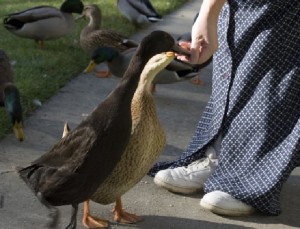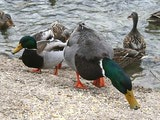How Can I Help?
by Wanda Holcombe
 Feeding Ducks bread, crackers, chips, donuts, popcorn, etc., is like feeding them “JUNK FOOD,” which is actually unhealthy and potentially dangerous for the birds. They offer little nutritional value and too much bread can lead to excessive weight and malnutrition as well as many other problems.
Feeding Ducks bread, crackers, chips, donuts, popcorn, etc., is like feeding them “JUNK FOOD,” which is actually unhealthy and potentially dangerous for the birds. They offer little nutritional value and too much bread can lead to excessive weight and malnutrition as well as many other problems.
• Duckling Malnutrition: Ducks will naturally seek out an easy food source such as human handouts, ducklings will not learn to forage for natural foods as easily.
• Overcrowding: Where an easy food source is abundant, ducks and other waterfowl will lay more eggs and the pond or lake will become overcrowded.
• Pollution: When too much bread is offered to ducks, not all of it will be eaten. The soggy, uneaten bread is unsightly and rotting bread can create noxious odors as well as lead to greater algae growth that can clog natural waterways. This concentrates the pollution and can eventually eradicate fish and other life in the vicinity.
• Diseases: Feeding ducks bread can increase the spread of diseases in two ways. First, a carbohydrate-rich diet leads to greater defecation, and bird feces easily harbor bacteria responsible for numerous diseases, including avian botulism. Second, moldy bread can cause aspergillosis, a fatal lung infection that can decimate entire duck and waterfowl flocks.
• Pest Attraction:Leftover food from satiated ducks can attract unwanted pests such as rats, mice, and insects, leading to the potential spread of diseases that can be harmful to humans. To mitigate this risk, it is crucial to address the issue promptly with proper waste management and disposal. Going to certified inspections by reputable pest control services can assist in identifying and eliminating potential infestations, ensuring a safe and pest-free environment for both ducks and humans alike. By proactively addressing pest control measures and dealing with common ant species, we can prevent the attraction of pests and minimize the associated health risks. Check out the best outdoor ant killer here.
Source of information: http://birding.about.com/od/birdfeeders/a/feedingducksbread.htm
What Do Ducks Eat?
 Ducks are omnivorous birds that will eat a wide variety of foods, and a varied diet provides good nutrition for healthy duckling growth, feather strength, muscle development, breeding success and more. Understanding what ducks eat can help birders provide a suitable diet for any ducks that frequent their local ponds or that may even venture into suburban or urban backyards.
Ducks are omnivorous birds that will eat a wide variety of foods, and a varied diet provides good nutrition for healthy duckling growth, feather strength, muscle development, breeding success and more. Understanding what ducks eat can help birders provide a suitable diet for any ducks that frequent their local ponds or that may even venture into suburban or urban backyards.
Foods Ducks Eat
Wild ducks eat a wide range of different foods and they are constantly foraging for meals and snacks. Foods ducks regularly eat include:
• Small fish and fish eggs
• Snails, worms and mollusks
• Small crustaceans
• Grass and weeds
• Algae and aquatic plants and roots
• Frogs, salamanders and other amphibians
• Aquatic and land insects
• Seeds and grain
• Small berries, fruits and nuts
In addition to these nutritious foods, some ducks will also eat sand, gravel and small stones to provide grit that aids their digestion. Grit may also provide trace amounts of critical minerals as part of an overall healthy, varied diet.
It is up to the community to help keep the ducks on Wells Branch Pond healthy. For more information visit the website: http://birding.about.com/od/birdfeeders/a/feedingducksbread.htm